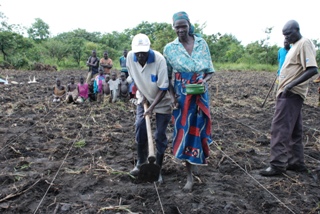FAO supports S. Sudan households with tools and seeds
July 7, 2016 (JUBA) – The United Nations Food and Agriculture Organisation (FAO) said it has distributed vital crop seeds and tools to over 180,000 household farmers in South Sudan.

The agency, however, anticipates that seeds will reach the farmers before the planting season, giving them enough time to prepare land.
According to FAO, most families in South Sudan had depleted seed reserves, either because they were unable to plant last year or because of low harvests. At the same, their incomes had reportedly reduced, lowering their purchasing power and preventing them from replenishing their reserves by buying seeds in local markets.
“In some cases, families have been forced to consume or sell their seeds for food’’, said Serge Tissot, FAO’s representative to South Sudan.
“Seed distributions have come at a critical moment. Without this support, many families would be unable to plant this year, meaning another year of relying on external assistance to meet their basic food needs,” he added.
The continuation of violence in South Sudan has forced many farmers to abandon their land, thus unable to plant food crops.
In areas where security has improved, such as Western Equatoria, Unity and Jonglei, farmers are returning and FAO’s support has been crucial in enabling them to plant and resume food production.
“With the food security situation dire, this is a critical time to ensure a decent harvest for South Sudan – last year, local production met about 70 percent of the nation’s cereal needs,” the agency said.
Meanwhile, FAO says it would continue collaborating with local and international partners to reach those in most needs, but stressed that getting the seeds to farmers on time remained a major challenge.
The season extends from as early as mid-March in the Equatoria regions up to June in Greater Upper Nile and Greater Bahr El Ghazal.
In Greater Upper Nile, FAO and its partners have reportedly provided seeds and tools directly to beneficiaries and scaled up distribution of seeds through seed fairs. These essentially involve giving vulnerable families vouchers with a pre-set value that they can use to ‘buy’ seeds at a local fair that has been organized with local traders.
Already, 80, 000 families have reportedly been reached through seed fairs in 2016, and over 110, 000 vulnerable families received their seeds through direct distribution done by the agency.
“With the seed fairs, we are increasing access to local, but high quality seeds in a sustainable way. The fairs also boost the local economy by working with local traders, which directly injects money into the market”, said Abdoul Karim, Deputy FAO Representative.
“FAO strives to implement all distributions through seed fairs as far as security and market functioning allows”, he added.
FAO and its partners have reportedly distributed over 170 000 vegetable seeds and tools and over 140 000 fishing kits across South Sudan.
The emergency response activities, FAO said, were supported by donors such as the Common Humanitarian Fund, and the Governments of Denmark and Norway, the Swiss Confederation, the United Kingdom and Northern Ireland and the United States.
(ST)
